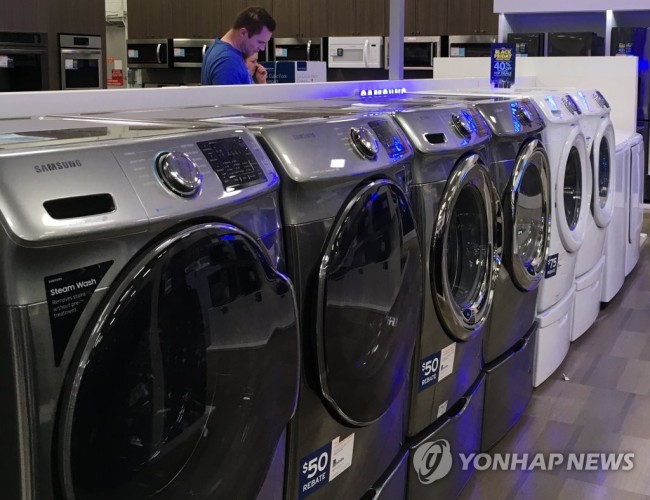South Korean washing machine manufacturers on Tuesday strongly protested the US International Trade Commission’s decision to issue “safeguard” import restrictions on their products, which are harsher than the institute had previously recommended.
Samsung said in an official statement that such restrictions will limit choices of US consumers, bringing a loss to the market.
Samsung had until now remained silent about the possibility of the US ITC actually imposing additional tariffs on washer imports as a safeguard for its own industry, instead, offering an olive branch by starting an operation of a new washer plant in New Berry, South Carolina on Jan. 12.
“With this decision, the US consumers who want Samsung washer‘s innovative functions and designs are given the burden of purchasing them at higher prices.” the company said, while adding that the production and supplies at the new plant will continue without any problems.
 |
| Washing machines displayed at a shop in the US. (Yonhap) |
LG strongly criticized the decision, saying it will inevitably harm the local job market.
“We are very disappointed in this misguided decision, which far exceeds what the US ITC recommended,” the company’s US branch said. “This is a textbook case about how certain companies can game the process to use trade laws to try to accomplish what they can’t accomplish in the marketplace.”
The latest ITC decision will hinder operations of the company’s new plant under construction in Tennessee, threatening local jobs, it said, as the operations of these factories would also be at risk, due to the ITC decision that will increase costs by far.
Both Samsung and LG export washers to the US manufactured from Vietnam and Thailand. A combined volume of the washer imports to the country is estimated to be over 2.5 million units a year, according to the industry.
Meanwhile, because exports of washing machines account for a small portion of Korea’s total exports, experts forecast the US safeguard restrictions would have a limited impact on the entire exports at less than 2 percent.
But the same restriction on the photovoltaic module exports would shave off about 10 to 30 percent of the total exports, since it is a larger industry, they said.
Some pundits advised the Korean government to grasp US President Donald Trump’s tactics for the upcoming renegotiations of the Korea-US Free Trade Agreement.
“President Trump seems to be taking pre-emptive actions before he addresses anti-free trade issues, possibly at Davos Forum,” said Junsok Yang, professor at The Catholic University of Korea.
Considering the latest ruling by the World Trade Organization in favor of Korea that the US imposed anti-dumping tariffs on Samsung and LG products through manipulated calculation in February 2013, the US ITC shouldn’t have made such a decision that goes against the bilateral FTA, Yang said.
“In my opinion, Samsung and LG should consider a withdrawal of their plants from the US, and should not yield to Trump,” he said. “The government should take strong action against the US restriction and down the road for FTA renegotiations.”
By Su-hyun Song
(Korea Herald)



